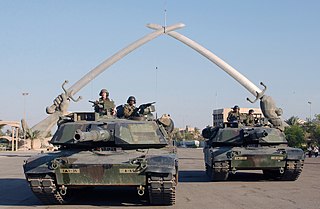
The Iraq disarmament crisis was claimed as one of the primary issues that led to the multinational invasion of Iraq on 20 March 2003.

Iraq actively researched and later employed weapons of mass destruction (WMD) from 1962 to 1991, when it destroyed its chemical weapons stockpile and halted its biological and nuclear weapon programs as required by the United Nations Security Council. The fifth president of Iraq, Saddam Hussein, was internationally condemned for his use of chemical weapons against Iranian and Kurdish civilians during the Iran–Iraq War in the 1980s. Saddam pursued an extensive biological weapons program and a nuclear weapons program, though no nuclear bomb was built. After the Gulf War, the United Nations located and destroyed large quantities of Iraqi chemical weapons and related equipment and materials; Iraq ceased its chemical, biological and nuclear programs.
United Nations Special Commission (UNSCOM) was an inspection regime created by the United Nations to ensure Iraq's compliance with policies concerning Iraqi production and use of weapons of mass destruction after the Gulf War. Between 1991 and 1997 its director was Rolf Ekéus; from 1997 to 1999 its director was Richard Butler.

This article describes the positions of world governments before the actual initiation of the 2003 invasion of Iraq, and not their current positions as they may have changed since then.

Opposition to the Iraq War significantly occurred worldwide, both before and during the initial 2003 invasion of Iraq by a United States–led coalition, and throughout the subsequent occupation. Individuals and groups opposing the war include the governments of many nations which did not take part in the invasion, including both its land neighbors Canada and Mexico, its NATO allies in Europe such as France and Germany, as well as China and Indonesia in Asia, and significant sections of the populace in those that took part in the invasion. Opposition to the war was also widespread domestically.

William Scott Ritter Jr. is an American author, former United States Marine Corps intelligence officer, former United Nations Special Commission (UNSCOM) weapons inspector and convicted child sex offender.

Judith Miller is an American journalist and commentator known for writing on the alleged existence Iraq's Weapons of Mass Destruction (WMD) program both before and after the 2003 invasion, whose writings were later discovered to have been based on fabricated intelligence. She worked in the Washington bureau of The New York Times before joining Fox News in 2008.

After the 2003 invasion of Iraq, evidence began to emerge of failed attempts by the Iraqi government to bring the conflict to a peaceful resolution.
William Rivers Pitt was an American author, editor, and liberal political activist.

The Al Qa'qaa high explosives controversy concerns the possible removal of about 377 tonnes of high explosives from the Al Qa'qaa facility by the Iraqi insurgency, after the 2003 invasion of Iraq. Although Pentagon spokesman Lawrence Di Rita said that the International Atomic Energy Agency (IAEA) has not come forward with documentation that explains how it arrived at the figure of 377 tons of missing explosives. The IAEA so far only has verified in its paperwork that 219 tons of explosive materials were at Al Qaqaa and surrounding facilities.

There are various rationales for the Iraq War, both the 2003 invasion of Iraq and the subsequent hostilities. The George W. Bush administration began actively pressing for military intervention in Iraq in late 2001. The primary rationalization for the Iraq War was articulated by a joint resolution of the United States Congress known as the Iraq Resolution. The US claimed the intent was to "disarm Iraq of weapons of mass destruction, to end Saddam Hussein's support for terrorism, and to free the Iraqi people".

A dispute exists over the legitimacy of the 2003 invasion of Iraq. The debate centers around the question whether the invasion was an unprovoked assault on an independent country that may have breached international law, or if the United Nations Security Council authorized the invasion. Those arguing for its legitimacy often point to Congressional Joint Resolution 114 and UN Security Council resolutions, such as Resolution 1441 and Resolution 678. Those arguing against its legitimacy also cite some of the same sources, stating they do not actually permit war but instead lay out conditions that must be met before war can be declared. Furthermore, the Security Council may only authorise the use of force against an "aggressor" in the interests of preserving peace, whereas the 2003 invasion of Iraq was not provoked by any aggressive military action.

The Bush–Blair 2003 Iraq memo or Manning memo is a secret memo of a two-hour meeting between American President George W. Bush and British Prime Minister Tony Blair that took place on 31 January 2003 at the White House. The memo purportedly shows at that point, the administrations of Bush and Blair had already decided that the invasion of Iraq would take place two months later. The memo was written by Blair's chief foreign policy adviser, David Manning, who participated in the meeting.

The United Nations Monitoring, Verification and Inspection Commission (UNMOVIC) and the U.S.-led Iraq Survey Group (ISG) failed to find any of the alleged stockpiles of weapons of mass destruction in Iraq that were used as an impetus for the 2003 invasion. The United States effectively terminated the search effort for unconventional weaponry in 2005, and the Iraq Intelligence Commission concluded that the judgements of the U.S. intelligence community about the continued existence of weapons of mass destruction and an associated military program were wrong. The official findings by the CIA in 2004 were that Iraqi leader Saddam Hussein "did not possess stockpiles of illicit weapons at the time of the U.S. invasion in March 2003 and had not begun any program to produce them."
The 2003 United States–British–Spanish Draft Resolution on Iraq was, according to Ambassador John Negroponte, "a resolution to have the Council decide that Iraq is not complying, is out of compliance, with Resolution 1441". Initially introduced on February 24, 2003, and amended on March 7, 2003, the draft set a March 17 deadline for Iraq to demonstrate "full, unconditional, immediate and active cooperation in accordance with its disarmament obligations." The draft was based on information from the Iraqi defector "Curveball," who claimed Saddam Hussein was in possession of weapons of mass destruction, which Curveball later admitted was untrue. The widely discussed UN resolution was not brought up for formal vote after it became clear that it would not have passed due to opposition from France, Russia, and China. The United States invaded Iraq without UN support on March 20, 2003, initiating the Iraq War.
Khidir Hamza is an Iraqi atomic scientist who worked for Saddam Hussein's nuclear programme in the 1980s and early 1990s. Following the Gulf War, he left Iraq in 1994 and went into exile in the United States. He provided testimony to Western intelligence agencies suggesting that Hussein's weapons of mass destruction programmes were active and ongoing. However, claims of active WMD programs including nuclear weapons have since been invalidated, and his self-described role as the former head of Iraq's nuclear weapons programme has been discredited.
In Shifting Sands: The Truth About Unscom and the Disarming of Iraq is a 2001 documentary by Scott Ritter that discusses the UNSCOM inspections in Iraq. Ritter was a chief United Nations weapons inspector in Iraq from 1991 to 1998. These inspections were in search of "weapons of mass destruction" during the later years of the regime of Saddam Hussein.
Operation Mass Appeal was an operation alleged to have been set up by the British Secret Intelligence Service in the runup to the 2003 invasion of Iraq. In December, 2003, former UN arms inspector Scott Ritter said it was a campaign aimed at planting disinformation in the media about Iraq's alleged weapons of mass destruction.
Context Books was an American independent publishing house founded by Beau Friedlander that featured often controversial and critically acclaimed titles from authors such as Derrick Jensen, Daniel Quinn, David Means, and William Rivers Pitt which operated from 1998 to 2004.










